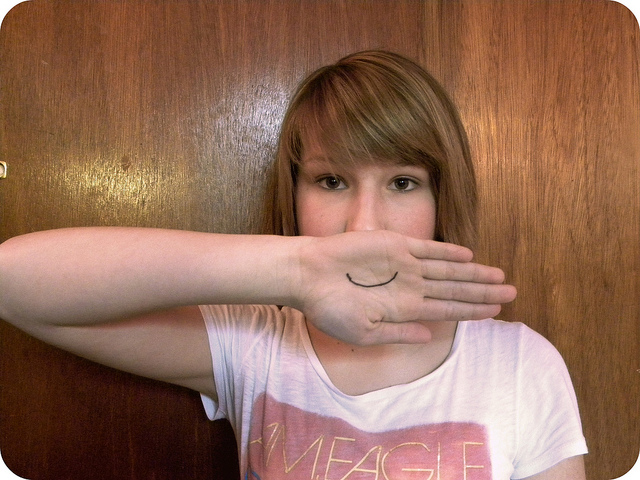Are you passionate about your work? Well stop it!
February 29, 2016
Once upon a time, passion for work was limited to artists and fire-brand politicians. But in today’s workplace, it seems to be all the rage. LinkedIn is full of people who are passionate about everything from customer service to quantity surveying and even embroidery. And employers seem to want people who are passionate about a type of work, a product or brand or a cause. But what does it actually mean and is it really so valuable?
Passion suggests extremely intense feelings about something: “I am so interested in/committed to/excited by this that I feel compelled to do it”. Who wouldn’t want work like that? And what organisation would turn down someone with that level of fervour? Well here are five reasons I think passion is over-hyped and unhelpful:
1. It’s self-absorbed
Before passion made its way into the workplace, we used to make do with enthusiasm. People got enthusiastic about specific things but could also be generally enthusiastic people who brought that enthusiasm to bear on whatever they happened to be doing.
These days it’s different. You are encouraged to ‘find your passion’. To identify that thing, that one special thing, which lights your fire and then do that whole-heartedly, single-mindedly, joyously. It’s part of our quest for meaning and, particularly, for meaning through the expression of our individuality. “This is me, doing what I do, being who I am and the result is this great work”.
But if it’s that fundamental to you, what happens if you are thwarted? Or if you come up against someone else’s passion and the two clash? Just how much more personal does criticism feel if your work is you and you are your work? We could be creating a workforce full of people who ‘just have to do what they have to do’ because this is who they are, regardless of how well it works for anyone else or the organisation as a whole.
2. It’s elitist
Wouldn’t it be lovely if we could all ‘find our passion’ and everyone ended up doing something they just love doing? But for society to function, we’d have to believe that someone’s passion is gutting fish or collecting rubbish or cleaning hotel rooms. And it isn’t, is it? Someone has to do the jobs most of us don’t want to do.
 Anyone can try to find satisfaction in a job well done, even it’s ‘look how clean this toilet is’. Many people enjoy the camaraderie and social interaction they get from their work, even if the work is tedious. But passion is something different and it doesn’t seem to be available to everyone. People whose work is their passion may easily come to believe that their job is incredibly important because it means so much to them. I suspect society as a whole would notice much more rapidly if cleaners, train drivers and shelf stackers stopped working than if branding consultants, interior designers and, yes, business psychologists called it a day. It’s not that this work doesn’t have value, of course it does, but let’s not be quite so precious about it.
Anyone can try to find satisfaction in a job well done, even it’s ‘look how clean this toilet is’. Many people enjoy the camaraderie and social interaction they get from their work, even if the work is tedious. But passion is something different and it doesn’t seem to be available to everyone. People whose work is their passion may easily come to believe that their job is incredibly important because it means so much to them. I suspect society as a whole would notice much more rapidly if cleaners, train drivers and shelf stackers stopped working than if branding consultants, interior designers and, yes, business psychologists called it a day. It’s not that this work doesn’t have value, of course it does, but let’s not be quite so precious about it.
3. It creates unrealistic expectations
If you’re one of the lucky ones who has found your passion, then your working life will be just peachy, won’t it? “Find something you love to do and you’ll never have to work a day in your life” runs a particularly glib motivational quote that pops up frequently on social media. Your passion will burn bright, you will be motivated and happy all the time. Utter tosh.
I’m one of the lucky ones. I find my job incredibly fulfilling. But am I H-A-P-P-Y every working minute of the day? Of course not. Do I leap out of bed on a cold, wet winter morning, knowing I have an hour or so of the M4 ahead of me before I meet I client? No. Some parts of my job are necessary but tedious and mundane. Luckily not many, but some. Life is like that. I think really everyone knows that but all this talk about passion makes it unacceptable to admit to boredom or frustration. Even as a psychologist, who should know better, I can find myself thinking I should feel something different from what I’m actually feeling when faced with people describing their passion. Which brings me to my next objection………
4. It creates emotional work
The sociologist Arlie Russel Hochschild coined the term ‘emotional labour’ to describe the work involved in portraying an emotion you’re not actually feeling.  Much of the research focused on airline cabin crew, so you can imagine the type of work I mean – smiling sweetly non-stop from Heathrow to JFK regardless of how obnoxious the passengers are. This type of work is generally reserved for public-facing roles.
Much of the research focused on airline cabin crew, so you can imagine the type of work I mean – smiling sweetly non-stop from Heathrow to JFK regardless of how obnoxious the passengers are. This type of work is generally reserved for public-facing roles.
But what if you join a ‘passionate’ company? The mission statement might say “We are passionate about…..” So there you go. Be passionate, it’s your job. Regardless of how you actually feel, you know what emotion you’re meant to display.
Of course, passion also has an emotional downside – tempestuous relationships, artists ripping a canvas apart when a painting goes wrong, that kind of thing. Is this really the sort of behaviour we want in offices up and down the country? People sweeping everything off their desks and rushing out screaming because their spreadsheets won’t reconcile or PowerPoint is playing up. I think not.
5. It leads to poor recruitment
I recently saw a trailer for the film Marguerite, about a rich woman whose passion for opera leads her to put on – and star in – her own productions. The only problem is that no one is brave enough to tell her that she can’t sing. Being passionate about something doesn’t guarantee you’ll be any good at it. I’ve assessed plenty of people whose capability doesn’t match their enthusiasm. Organisations are often blinded by a passionate candidate, something which tends to give extroverts an advantage over quieter, but no less capable, introverts.
It’s great if people enjoy their work and are happy. But just how happy do they have to be and is it compulsory? Surely it should be enough for someone to come to work and diligently do a good job without them having to sing it from the rooftops.
I once bought a stain removal product, which, according to the box, works because they “care about cleaning”. Call me an old cynic but I want it to work because they understand chemistry. It’s the same recruiting people – great if they’re enthusiastic, even better if they know what they’re doing. If you need help distinguishing the two in any senior appointments you’re making, do let me know: caroline@carolinegourlay.co.uk.
Photo credits





Thanks again Caroline for a provocative article and for putting the use of this word back in its box!
‘Passionate’ has almost become a ‘must say’ word about anything and everything. It is over-used to the point of being meaningless and I’m thinking ‘Where is the substance? Where is the evidence?’ It’s a shame. It’s a lovely word when used appropriately, but for me, it has become a signal which shouts ‘you can stop listening now’.
Hearing individuals (typically at networking events) saying “I’m passionate about my job/work/business/customers/… “, I’m usually thinking “No, you are not. You are not passionate about anything except, maybe, trying to impress”. Sorry, but you’re failing to impress. Those who are really are passionate about a cause/calling/vocation/… and maybe even their job/work/business/customers/… just don’t use the word.
These truly passionate people are obvious from the way they conduct themselves and immerse themselves in their endeavours. You can see, and sometimes even feel the joy, and the pain, and the pride they take over their undertakings and resulting accomplishments. And if things don’t work out, they’re disappointed, but interpret what they’ve learned, bounce back and try another tack.
If we must talk about being passionate, and sometimes we feel we must, then let’s mean it. Substantiate it. Demonstrate it and give examples of what it means to be intensely emotional and enthusiastic about a particular subject.
A good blog, saying something that needs saying.
I would go further than you, perhaps, by saying that there are two sorts of passion at work: passion and affected passion. Most passion is affected, insincere. Even as they are writing about how passionate they are about sewage management, they are feeling anything but.
Personally, I have a low threshold for this sort of deception: it is the thin of an unpleasant wedge, the thick end of which is lying and manipulation. I don’t want to do business with someone who is lying to me before they even know me, thank you.
Your point 2: Someone needs to write an article about the word “elitist” along the lines of your one about “passionate”.
Your point 4: I would make a distinction between small businesspeople who claim to be passionate about what they do, but aren’t, and those in the service industries. It doesn’t take much effort to smile at a customer, or at least treat them civilly. If someone has to expend large amounts of “emotional work” just getting through the working day, then they would do better to inspect their own crippling judgement of others and do something about that first.
In any case, “emotional work” is a subject that has been around for decades under the names persona (Jung), bad faith (Sartre), false self (Winnicott) and so on. It’s not about “emotional” “work” because, in many cases, the person enjoys, and gets a positive benefit from, this form of deception *.
Your points 1 and 3: I infer that you think that people who go on about how passionate they are are making it all about themselves. I agree. This will then lead to disappointment in prospects and clients, and in the individual themselves.
Given that passion is as unsustainable an emotion as anger, I’d like to suggest a different perspective which I have found benefits everyone. It comes from Nick Williams’ book, The work we were born to do.
I think everyone, whether in employment or doing voluntary work, is most content when they have found the work they were born to do and have the opportunity to do it. If you have achieved that state (and Nick would argue that it is available to most, if not all, people), you don’t need to tell people how passionate you are, or how anything else you are. You don’t need to mention (god forbid) that you have found the work you were born to do.
It is just obvious. It is apparent in your way of being, and in your way of working. It gives a congruence which is impossible to achieve by sticking on adjectives.
—
Here is a relatively well-know passage from Sartre’s Being and nothingness:
“Let us consider this waiter in the cafe. His movement is quick and forward, a little too precise, a little too rapid. He comes toward the patrons with a step a little too quick. He bends forward a little too eagerly; his voice, his eyes express an interest a little too solicitous for the order of the customer. Finally there he returns, trying to imitate in his walk the inflexible stiffness of some kind of automaton while carrying his tray with a recklessness of a tight-rope walker by putting it in a perpetually unstable, perpetually broken equilibrium which he perpetually re-establishes by a light movement of the arm and hand.”
.
This is a waiter playing the role of being a waiter.
Caroline, it took me a while to respond to this because my first reaction was surprise and some disagreement. However the more I thought about it the more I agree with you.
Entrepreneurs, artists, those in the creative jobs can clearly be driven by passion, in fact I think they should be to be great. That list however, leaves out a good sized majority of people. So what should they do? I agree, enthusiasm is a reasonable word and a good description of the emotions around how the others feel about what they work at. Their passion may be coaching the kids football team, or serving in a homeless mission – nothing to do with their job. And that’s just fine.
Passion is a driver when channelled positively, but there is no law that says you must find it at work. Indeed I’ve been, and am passionate about certain elements of roles I have had in employment and more recently in my own consulting practice. I know what it is, I know how it drives me to get up each day, but I would not expect the girl in the chemists this morning who served me to be passionate, neither the bus driver who took me down there. If they are – then good for them, but it is totally unreasonable to expect everyone to be passionate at work.
This was a great exercise for me and as I coach others in business, I will remember your missive. Finding passionate people and developing them is one thing, finding enthusiastic people who just want to achieve more is good too, and it would to have an expectation of passion at work for everyone.
Really enjoyed this and some great thought-food
Thanks, alrien
Thanks for the positive comments. I’ve had more response to this than anything else I’ve written, so I guess it struck a chord. I recently saw a problem page letter about careers in the Guardian that I think illustrates the problem with ‘passion’ perfectly. It’s the second letter in this link: http://www.theguardian.com/money/2016/apr/16/dear-jeremy-work-problems-solved-careers-expert-advice